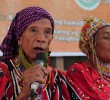Chunk of Pinoy Cash from Abroad Still Outside Bank Sphere
by JEREMAIAH M. OPINIANO
www.ofwjournalism.net
MANILA � NEARLY a fifth of cash being sent by Filipinos abroad for the past five years remained outside the sphere of banks and formal channels, data from the Bangko Sentral ng Pilipinas shows.
The country�s balance of payments data, which the BSP revised recently to comply with a new International Monetary Fund reporting standard, showed that overseas Filipinos sent some US$8.24 billion of cash remittances through informal channels from 2001 to 2005.
The amount is 17.18 percent of the five-year total US$47.975 billion cash remittances of overseas Filipinos, data from country�s central bank showed.
Under the revised BoP data, cash worth US$39.735 billion flowed through formal banking channels.
In terms of year-on-year share, money sent via informal channels appears to decline: from 21.89 percent of the total remittances in 2001, 19.99 percent in 2002, 16.65 percent in 2003, to 16.66 percent in 2004.
Informally-sent remittances further declined to 13.06 percent of the total US$12.3 billion the BSP recorded as money sent by overseas Filipinos to the country last year.
According to BSP director Iluminada Sicat, this chunk worth US$1.6 billion represents cash remittances through informal channels while the US$10.7 billion �represents hard currencies that drive exchange rates, as well as the domestic economy.�
The latter amount, explains the head of BSP�s Department of Economic Statistics, would near-accurately describes the real contribution of remittances to Philippine economy, which has been overtaken by its neighbors since the Asian financial crisis almost a decade ago.
�We have consistently told the public that the OFW [overseas Filipino workers] remittances we have reported are those that pass through the banks,�� Sicat told the OFW Journalism Consortium.
The BSP is just on its second year of using the �new series� to report remittances in measuring the BoP.
The country�s BoP, which measures the Philippines�s total trade with other countries, had a surplus of US$2.407 billion in 2005, a big improvement from a US$280 million deficit in 2004. As of February this year, the BoP position revealed a US$2.209 billion surplus.
In transit
RECORDING money flows became crucial as international financial institutions imposed new policies to regulate cash transactions in view of increasing disparities in wealth among nations, the use of money by armed groups, and accounting issues linked to huge corporations.
Likewise, the World Bank, the world�s biggest lender, expressed interest on migrant remittances as these �has surpassed official development assistance (ODA), private equity flows, and foreign direct investment (FDI),� according to a recent study funded by the IMF.
�Given the implication of such transfers for recipient countries, there is now an avid interest among researchers and policymakers in analyzing the economic and social impact of remittances on the economies of the receiving countries,� the authors wrote.
Being the fifth largest recipient of all types of remittances from countries� diaspora populations, the Philippines is a shoo-in candidate for applying these regulations.
Thus, the BSP adopted a �new series� of reporting remittances as per a directive by the IMF in its BoP Manual 5.
BSP�s Sicat explained that the new series sees remittance flows being reported in accordance to a set of residency criteria that classifies the remitters from abroad.
Remittances of �resident OFWs� such as seafarers and overseas performing artists (OPAs) whose contracts are less than one year, are recorded under the compensation of employees item in the income account.
Meanwhile, remittances of �non-resident OFWs� who have been staying and who have contracts for over a year are recorded as �workers� remittances� in the current transfers account.
Sicat said the BSP, in the new series, reports an amount that represents the overseas Filipino�s whole income deducted by his or her expenses abroad (represented as negative in the travel imports item in the Services account), and remittances in kind such as balikbayan boxes sent home (represented as negative also in the goods imports item in the Goods account).
Thus, if the resident OFW has a gross income of US$1,000, his cost of living allowances is worth US$300, and his cost of sending a balikbayan box is US$100, his net remittance is US$600, which is recorded under the item �compensation of employees�.
Meanwhile, if the non-resident OFW has cash remittances worth US$1,000, and his expenses for sending a balikbayan box is US$200, his net remittance of US$800 is recorded under the current transfers item �works� remittances�.
In formality
BASED on the BSP data and a 2004 Asian Development Bank study on Filipino migrant workers� remittances, monetary authorities have a long way to go for banks to capture this money.
The ADB study noted that about 38 percent of recipients in the Philippines prefer the informal and non-banking methods, �primarily due to lower remittance costs�.
Other overseas Filipino workers (OFWs), on the other hand, bring home their cash at the end of their contracts, the study added.
These include overseas performing artists (OPAs) in Japan and contract workers in Taipei, whose employers have a forced savings scheme that sees workers receiving a lump sum amount at the end of their work contracts.
Informal channels or means of sending remittances are a frequent occurrence, most especially the padala practice, because �fees are not normally charged by the carrier� [T]his is done to return a favor, or as a gesture of hospitality,� the ADB study said.
These findings may change after Sicat finalizes the 2005 figures for all types of remittances as per the new series.
She told the OFW Journalism Consortium her office is still awaiting the release of the 2005 Survey of Overseas Filipinos by the National Statistics Office. The NSO surveys OFWs who were in the country from April to September every year to find out the amount of remittances they send.
She said the BSP is intensifying its monitoring system to ensure that commercial banks report remittance flows.
Previous formats Sicat added, noted �misclassifications� and thus BSP regularly audits all the total remittances it reports.
Notably, there is also a forthcoming report by a technical sub-group (TSG) on the Movement of Persons �formed during a joint meeting of the WB and the IMF last year� that would change the way the �workers� remittances� item is measured in the BOP.
Executives of both lenders reportedly agreed to replace that item with �personal transfers� to cover all current transfers in cash or in kind made or received by resident households to or fro other non-resident households.
It said this is because the concepts of �personal transfers� and �remittances� are based on the concept of residence rather than migration status, the concept of �migrant� be replaced by the concept of �residence� in the BOP.
Nonetheless, Sicat admits the IMF-imposed new series of reporting remittances has �changed the way BSP records and monitors information� about all transactions coming in to the Philippines. (OFW Journalism Consortium, Inc.)










